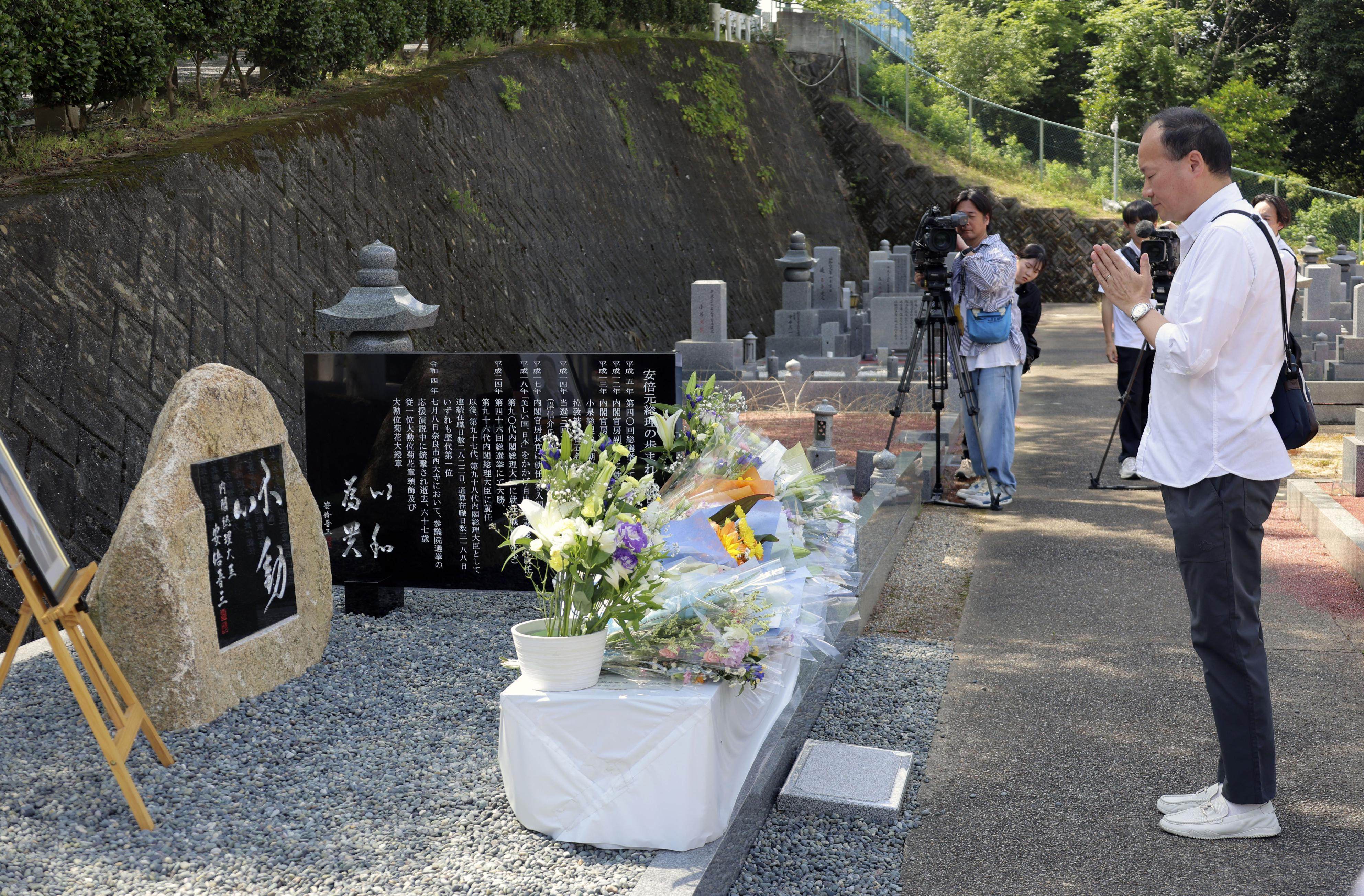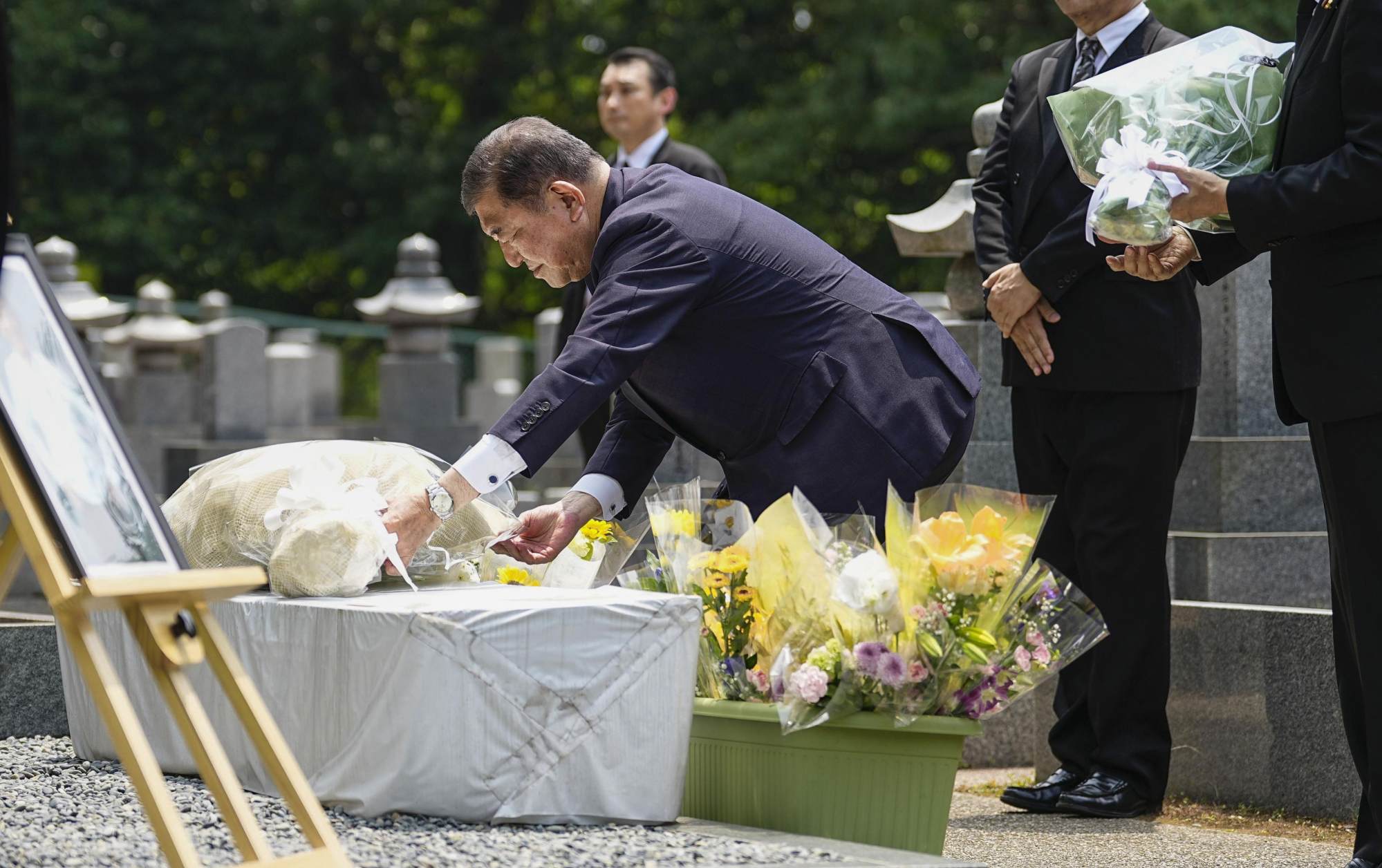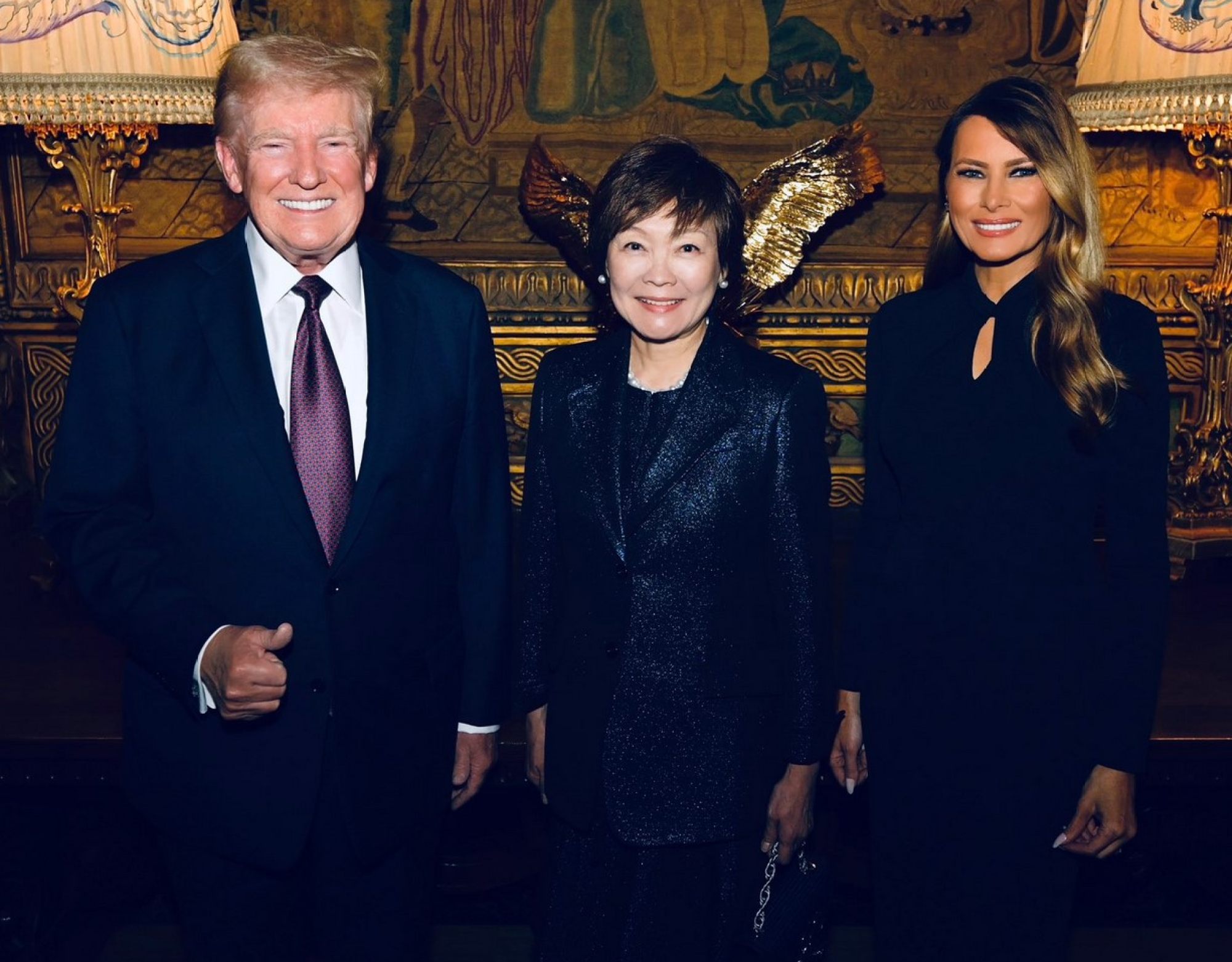Japan ‘needs Abe’: political turmoil sparks nostalgia for former prime minister
On the third anniversary of his assassination, the former prime minister’s legacy continues to loom large over the struggling ruling party

Three years after the assassination of Shinzo Abe, Japan’s longest-serving prime minister, his legacy continues to cast a long shadow over a struggling ruling party and an embattled successor, fuelling a wave of public nostalgia ahead of Sunday’s crucial upper house election.
Abe, remembered as a polarising yet dominant figure who shaped Japan’s modern conservative identity, was gunned down on July 8, 2022, while campaigning in the city of Nara.
Prime Minister Shigeru Ishiba quietly observed this year’s anniversary by laying flowers at the site of Abe’s murder, in what some saw as an effort to tap into his predecessor’s enduring public appeal.
In Abe’s hometown of Nagato in Yamaguchi prefecture, his widow Akie placed flowers on his grave, telling reporters: “He was able to work hard for the country, feeling at ease thanks to the support he received in elections.”

She was joined by Sanae Takaichi, a former cabinet minister who was once widely seen as Abe’s natural heir on the nationalist right. “I feel frustrated when I hear people wondering how the world would have changed and how Japan would have been if Abe had been alive,” Takaichi said.
Today’s Liberal Democratic Party (LDP) is a shadow of the political behemoth that Abe oversaw as prime minister during two spells for a total of nine years until he stepped down in September 2020 due to ill health.
Two LDP prime ministers have already come and gone, and Ishiba is clinging on by his fingernails ahead of Sunday’s election.
Already the head of a minority government, a public-opinion poll released by national broadcaster NHK last week showed his cabinet support rate at a paltry 31 per cent, down from 39 per cent in early June. Observers believe that if he fares poorly at the ballot box on Sunday, Ishiba will have no choice but to step down.
Yoichi Shimada was a close personal friend of Abe and acted as an adviser on international issues as an academic at Fukui Prefectural University, but has since turned his back on the party that he supported all his life.
“I’m very disappointed by what the LDP has become,” he told This Week in Asia. “A lot of us saw Takaichi as Abe’s successor, but she has not proven herself to be the fighter that Abe was, and the party needs.”
Shimada was so disillusioned with the LDP that he left his university position and ran as a candidate for the far-right Conservative Party, winning a seat in the Lower House of the Diet last October. The party is one of a number that are emerging on the extreme right of Japanese politics, appealing to members of the public who feel equally let down by what the LDP has become.
Abe, Shimada said, would never have allowed that to happen, and his resolve would have meant Japan retained its standing on the world stage.
Unhandled type: inline-plus-widget {“type”:”inline-plus-widget”}
“Abe had strong and constructive relations with President [Donald] Trump in his first administration and when the crisis blew up in 2017 when North Korea threatened to fire missiles at Guam, it was Abe who dispatched Japanese warships to escort US supply ships, freeing up US vessels for offensive actions.
“Abe showed his strategic strengths and Trump was grateful for that assistance,” he said. “And Trump never forgot.”
Ishiba, on the other hand, had “been a disappointment”, he said.
“He is the opposite of Abe. He constantly gives in to pressure from China and always wants to take a neutral position between the US and China. That has irritated Trump and the Republican Party in the US, and the result is that Japan is being hurt by a trade and tariff war.”
Shimada insisted that if Abe was still prime minister, he would have been able to handle Trump’s demands better and that none of the tensions that mar the relationship today would exist.
‘Unique combination of one-offs’
Others share similar sentiments, with Ruri Miura, a political scientist and founder of the Yamaneko Research Institute think tank, telling the Nikkan Sports newspaper that Ishiba’s comments that he would not permit Trump to take Japan lightly came across as “sad”.
“Abe would not have said such a thing if he had been negotiating with the Trump administration. He would have said it with a bright and fighting spirit, with a touch of humour.”
An editorial in the conservative Sankei newspaper on Wednesday declared: “Japan’s floundering politics need Shinzo Abe’s legacy” and said the nation was confronted with a leadership crisis.
The newspaper claimed Abe had a “coherent national vision and strategy” and that he “boldly sought to preserve the global order and regional peace and stability.” It praised his vision for a “free and open Indo-Pacific” and claimed Japan’s international standing was high when he was alive.

Given the chaos that Trump has unleashed since he took power in January, “surely many people wish that Abe, who enjoyed a close personal relationship with Trump, was still alive”.
The current international situation is “foreboding,” it added, criticising Ishiba for failing to step up and protect the nation from “the nuclear-armed dictatorships of China, North Korea and Russia”.
And it has a stark warning for the ruling party: “Unless the LDP comprehends the significance of Abe’s politics and champions them, its core supporters are unlikely to return.”
Michael Cucek, a professor of politics and international relations at the Tokyo campus of Temple University, said that prediction could well come true.
“Abe had a [public relations] machine when he was in power, and he is still benefiting now as it continues to put out the ‘wasn’t he great’ message and there are still people who are dedicated to his memory,” said Cucek.
“While he was in power, this orchestra made him seem better than he was,” he said, adding that while Abe headed the party, he was able to harness the competing far-right factions and keep them loyal within the LDP. Today, he said, the party’s right wing was “bleeding out into small extreme parties”.
During Abe’s reign, there were reasons for Japanese people to feel more optimistic about everyday life, Cucek agreed, although some of his economic policies were simply not sustainable, such as the “complete repudiation of neo-liberal policies” that caused the national debt to continue to rise and become a problem for future generations.
Abe was also a friend to the CEOs of big corporations, brought down the suicide rate and was even open to LGBTQ rights and measured immigration – unthinkable for right-wing administrations in other countries, Cucek pointed out.
“It is no wonder that there is a nostalgia for the Abe years among ordinary people now, as that was a time when the LDP was not the complete shambles that it is today.”
But all the hankering on the right for a leader to fill his shoes will remain unfulfilled, Cucek believes.
“It won’t happen. Abe was a unique combination of one-offs and Japan will not get anything like him again.”